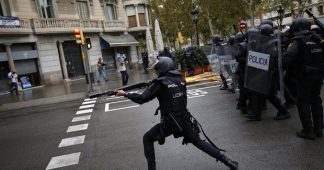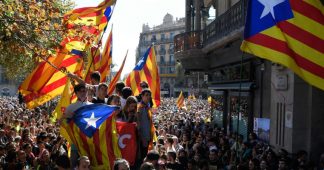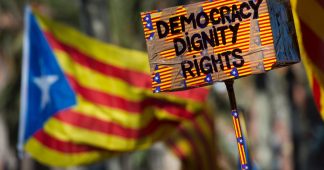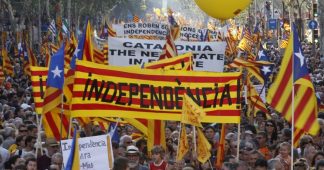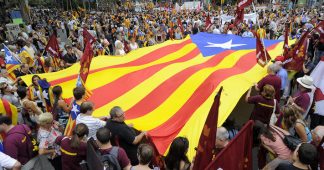The crisis in Catalonia is an opportunity to build a new, democratic and plurinational Spain.
After last weekend’s contested referendum was marked by widespread police violence, the standoff between the Spanish and Catalan governments continues.
The stakes were increased when Regional Premier Carles Puigdemont told the BBC that Catalonia would unilaterally declare independence within “in a matter of days.” This was followed by a judgement from the Constitutional Court in Madrid suspending Monday’s session of the Catalan parliament.
Radical independence party the CUP responded by demanding a session be held in defiance of the ban. However, with major corporations and banks threatening to move their legal headquarters outside the region, the conservative Puigdemont now seems less certain. Any move towards a declaration would most likely result in Mariano Rajoy’s right-wing government suspending Catalonia’s autonomy.
Amidst an increasingly-polarized climate, international press coverage has tended to overlook the position of En Comú Podem, the political alliance which has won the last two general elections in Catalonia. This grouping comprising Ada Colau’s Catalonia En Comú and Unidos Podemos has tried to carve out a middle road in the current confrontation.
It recognizes last Sunday’s vote as a legitimate political mobilization but doesn’t view it as a valid referendum. It also defends Catalonia’s right to decide but favors a plurinational, federal Spain. In this respect Colau, who is Barcelona’s mayor, voted in solidarity with those facing police repression but left her ballot blank.
Speaking to Jacobin contributor Eoghan Gilmartin, Podemos MP Txema Guijarro argues that there is now an opportunity for the Spanish left to take the lead by reaching out to Catalan nationalists and offering a route out of the impasse.
EG: Many in Podemos predicted that October 1st’s vote would be met with violence. But were you surprised by the extent of the crackdown?
TG: In one respect, the level of violence was shocking. In another, it was entirely predictable. Spain has a government which refuses to seek a political solution to the conflict, instead treating it as a law and order issue to be solved by the police. By sending thousands of police officers to Catalonia in the weeks leading up to the vote, it was clear what the government’s intentions were. Rajoy famously said “we are going to oblige [the Catalan government] to do what they don’t want to do.” This summarizes perfectly the Partido Popular’s attitude to the crisis.
EG: What is Rajoy’s wider strategy? What does his government hope to achieve through the crackdown?
TG:
Rajoy’s position on this question is the one that the Spanish Right has articulated for two centuries; namely, a refusal to adapt a centralized state to the existence of the distinct peoples and nations which comprise Spain. There is no question of discussing alternative territorial models or even negotiating within certain parameters: the law is the law and it must be upheld.
In this sense they have no strategy except to continue ratcheting up the pressure on Catalonia. They are operating at a tactical level, reacting to the moves of the Catalan government and hoping eventually to exhaust the independence movement. Rajoy believes time is on his side but, for me, this is a serious miscalculation.
There is a famous anecdote about Franco and how he had two piles of paper on his desk. One pile consisted of all the problems that time would be able to resolve and the other, all the problems which time had already resolved. This is the attitude of the Spanish Right—we have the state, we have the power and so eventually you will have to give way. But seven years into the crisis in Catalonia, this isn’t working.
EG: Given the Partido Popular’s willingness to escalate the conflict, has the Catalan government’s decision to press ahead with the independence process been the correct one?
TG:
First, I would say that the current Catalan administration didn’t have a mandate to hold a unilateral referendum. They framed the regional elections two years ago as a plebiscite on independence but the results fell short of their expectations. They failed to win a majority of votes and have only been able to count on a slender majority of seats with the support of the radical leftwing CUP. To follow this result with a strict timeline for unilateral independence was not legitimate. Also, they passed the two laws in September—one on the referendum and the other on the possible divorce from Spain—without a proper parliamentary debate or time to discuss amendments.
We acknowledge the Catalan people’s deep sense of frustration at being repeatedly denied their right to decide on their future relationship with the Spanish State, but the vote on Sunday cannot serve as the basis for a declaration of independence. It did not meet the basic conditions needed for a free and transparent vote on the issue. Largely, this was because of the actions of the PP government—but there was also a large percentage of the Catalan population which refused to recognize the legitimacy of the vote and didn’t participate.
There was an unacceptable violation of civil rights in Catalonia and the Rajoy government is responsible. However, with the Catalan government now contemplating a unilateral declaration of independence, their own responsibility in this standoff has to be acknowledged. The most likely outcome will be further confrontation and the Partido Popular suspending Catalan autonomy.
EG: What do you think the Catalan government hopes to achieve with this declaration?
TG: For many in the independence movement it would be seen as a means to force the Spanish government to negotiate. They hope that this would, ultimately, secure a legally-recognized referendum. Rajoy has left the movement with few other options. When there is no possibility for dialogue, people resort to more desperate measures. Of course, there is also an important sector which believes in pushing forward unilaterally, the more hardline independentistas.
EG:What is the alternative to this standoff? How can the left in Spain counteract the belligerence of Rajoy and the Spanish Right?
TG: There is only one way: to assemble a broad alliance of progressive forces and regional nationalists. Periods of conservative restoration have tended to come after the failure of such an alliance. This is a constant in our history, it was true of the collapse of the First Republic at the end of the 19th century as well as the failure of the Second Republic, which led to General Franco. In contrast, it was the alliance between progressives and nationalists in regions such as Catalonia that underpinned the post-Franco transition to democracy. This is going to be the key again to defeating the immobilismo [reactionary strategy] of the Right.
EG: How would such a pact be formed, and what would be its substance?
TG: It needs be based around a constituent process. For us, the Catalan crisis is part of a wider crisis of the constitutional regime of 1978. Spain’s crisis has three parts: the exhaustion of the current territorial model, the failure of the socio-economic model and a deep institutional crisis rooted in questions of transparency and the separation of powers. This tripartite crisis requires not only a reform of the actual constitution but a break with the current regime. The 1978 constitution fulfilled a historic role, securing the transition from dictatorship. It is important to acknowledge this. But it is no longer fit for purpose.
Podemos proposed a referendum at a national level in our 2016 election program, asking all Spanish citizens firstly if they wanted a constitutional change and secondly how far should such a change go, including the option of a new constitution. But we also said that given the existence of the Catalan people as a political subject, they have the right to be consulted, to decide their future in a legally-valid referendum. The alternative constitutional model we want to construct is one in which the peoples of Spain freely consent to being part of a federal state.
This recognition of Catalonia’s right to decide separates Podemos from the other major parties in Spain. However, we distinguish this idea of the right to decide from the right to self-determination as recognized under international law. It is clear that the Catalan situation is not that of colonial Africa in the 1960s and 70s or one of oppression which would justify the activation of the legal right to self-determination. A better comparison is Québec. The Canadian Supreme Court ruled in 1998 that although the right to self-determination was not applicable, basic democratic principles required that if a clear majority in the region wanted to secede, Canada would be obliged to negotiate such an exit. To deny the legitimacy of this claim would be antidemocratic.
EG: In any such pact the center-left Socialist Party [PSOE] would be key. Wouldn’t a Catalan referendum be a red-line for them?
TG: The situation is complicated enough without imposing red lines. What we have called for is dialogue and right now this has to be the priority. The first task is to force Rajoy and the Partido Popular out of power. We have called on Pedro Sánchez [leader of PSOE] to bring a motion of no confidence against the government. It is a minority administration and on a number of occasions it has failed to win a majority in the parliament. Two weeks ago when their center-right allies Ciudadanos brought a motion in support of the government’s repressive strategy in Catalonia, the majority of deputies voted against it. The numbers exist, what is lacking is the political will.
EG:How do you view PSOE’s response to the crisis? Pedro Sánchez seems to want to remain on the sidelines, neither endorsing Rajoy’s hardline nor backing Podemos’ call for a motion of no-confidence against the government.
TG:This position is not only cowardly but also fails to look beyond his own short-term interests as party leader. There is no consensus within PSOE on what their response to the conflict should be—which is a problem. During the recent primaries for the leadership, the territorial question was one of the sharpest points of internal division. Sánchez wants to try to satisfy the various factions of his party but there are historical moments when you have to declare your position one way or the other.
PSOE’s current line is that the government has to both negotiate with the Catalan government and defend the territorial integrity of the Spanish state. It is a mixed message. They won’t even make clear the terms on which such negotiations should take place. The question for him and his party is: do you recognize the existence of the Catalan people as a political subject, yes or no?
There cannot be anymore equivocating with the idea of a cultural subject without sovereignty. We already know that Catalonia is a cultural nation but are you going to recognize the political rights of Catalan citizens? Without answers to these questions PSOE will continue to condemn the country to an impasse. Ultimately it is they who will determine the balance of forces.
EG:One thing that distinguishes Podemos from the traditional discourse of the Spanish left is the party’s appropriation not only of the idea of patria [homeland] but also of the word Spain, itself. How does this fit in with your idea of a plurinational state?
TG: Our aim is to resignify the term patria, to construct a national project that is inclusive. We want to refound Spain free from the fear that shaped the transition from Francoism. There were positive things about the ’78 regime but the text was heavily influenced by the Church and, above all, by the army for whom the indivisibility of Spain has been something sacred. But Spain is no longer that country. What the indignados movement showed is that there is a clamor for greater freedom and democracy not only in Catalonia but throughout the country. So our proposal to the Spanish people is that we will found a new state capable of meeting those demands.
The countries in the south of Europe, at the periphery of the EU, need to gain a new self-confidence. It should not simply be Spain, there are also options such as a pan-Iberian confederation. Some might associate this with the annexation of Portugal, but that misses the point—the aim would be a political refoundation of the Iberian Peninsula via a free and sovereign decision taken by all its peoples: the Basques, Catalans, Portuguese, and so on.
This is the type of geopolitical vision for the Europe that we want. The only way to respond to German hegemony in Europe is through forms of political unity and coordination. Otherwise we can be sure that it will be German bankers who continue to win out at the expense of the peoples of the European south.
EG:What is your prediction for the next stage of the Catalan confrontation? Are you pessimistic?
TG:At times I feel we are at the edge of an abyss. But we have to see the crisis as an opportunity to demonstrate to the Spanish people that there are alternatives. We are not condemned to this collision between Madrid and Catalonia. A key reference for me is Barcelona mayor Ada Colau whose handling of the crisis has been exemplary. She represents the only real point of intersection in the region between those in favor of independence and those opposed—bringing them together around a discourse defending civil rights and democratic freedoms. So yes, there is a positive way out of this conflict but it really depends on us being able to govern, to start changing things in this country from the executive.
